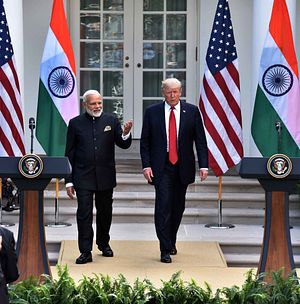In April 2016, former U.S. ambassador to India, Robert Blackwill described the U.S. policy paralysis towards Pakistan in these evocative words:
…every time a new administration in Washington comes to office, they get worried about Pakistan, which has a stockpile of nuclear weapons. The (U.S.) Secretary of State then visits Pakistan and meets the top leadership. He is systematically lied to by Pakistan’s leadership, and this goes on for about two years. In the third year, he tells his colleagues at the U.S. State Department that Pakistan’s leaders have been lying to him. Then they think about how to deal with the situation, and the elections come in and a new administration takes charge. The same thing is (then) repeated.
This vicious rent-seeking cycle through which Pakistan has managed to bewilder many previous U.S. administrations seems to be unraveling now. Trump’s tweet putting Pakistan in the dock was quickly backed up by an administration announcement that it would suspend nearly all security aid to Pakistan. The New York Times also said that this suspension is a complete freeze, and does not involve diversion to non-military uses, as was the case in many previous suspensions. In a separate move, the U.S. has placed Pakistan on a special watch list for severe violations of religious freedom.
The obvious first question then is, what is driving this policy change? The fact that Pakistan has indulged in ‘duplicitous policies’ and ‘double games’ over Afghanistan is a fifteen-year old story that hitherto failed to prevent U.S. from handing ransom money to Pakistan. The frustration has a role to play but is not sufficient by itself to cause a major policy change on Pakistan. In addition, there is another important factor: the China-Pakistan combine. Growing Chinese influence over Pakistan and in the Indian Ocean is causing the U.S. to reassess its policy towards Pakistan. Seen from this frame of balancing China, there are two mutually exclusive strategic calculations that can help understand U.S. policy reversal.
The first logic is one of strategic bargain. The U.S. is trying to flex its economic muscles to impress upon Pakistan that embracing China will have serious repercussions. The aim of this strategy then is to ensure that Pakistan falls back into the US-Saudi Arabia alliance. If Pakistan responds positively to the U.S. pressure, by way of agreeing to send troops to Yemen for example, it will be back in the good books of the US. The cycle that Robert Blackwill spoke about will resume after a minor operational glitch.
The alternative logic is one of rebuff. If the U.S. perceives that Pakistan has reached a point of no return with regards to its embrace of China, walking away from Pakistan’s rent-seeking becomes easier. In such a case, Washington’s focus would instead be on reducing the effectiveness of the China-Pakistan combine.
How does this affect India?
If the U.S. is following the first logic of strategy, then it is business as usual for India. But if the U.S. is rebuffing Pakistan, India is better placed for two reasons. One, this would mean that China will get mired in Pakistan’s domestic problems further. This closeness between two different worldviews will bring out friction points that have only been minor irritants up to now. Two, this would also mean that the U.S. will be a more willing partner for India given the common adversarial combine that these two states face.
Hence, even if the U.S. is following the logic of strategic bargain, India must attempt to create conditions that can bring the logic of rebuff to the forefront. India’s position on the Belt & Road initiative holds it in good stead. A difficult but interesting opportunity is if India can help support the supply chain of the NATO Forces in Afghanistan by utilising its friendly relationships with Iran or Central Asian States.
Finally, a point of concern for India should be that whatever might be the drivers of the Trump administration’s policy position, the reduced capacity of the State department—caused due to ‘draconian’ budget cuts and a dismissive attitude toward the diplomatic community—will constrain the implementation and outcomes.
Nitin Pai and Pranay Kotasthane are with the Takshashila Institution, a centre for research and education in public policy.

































